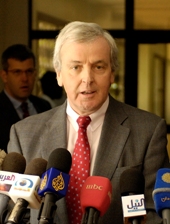UN humanitarian chief tours Sudan
March 23, 2007 (JUBA) — The new U.N. humanitarian chief inaugurated his term this week with a visit to Sudan, telling senior government officials they must stop hindering the work of aid groups in the country.
 The remote western Sudanese region of Darfur has become “the biggest humanitarian operation in the world, of enormous significance,” both for Sudan and for regional stability, said John Holmes on Friday.
The remote western Sudanese region of Darfur has become “the biggest humanitarian operation in the world, of enormous significance,” both for Sudan and for regional stability, said John Holmes on Friday.
“It’s not the easiest place to start, but it’s the obvious place, and the most important one,” Holmes, the new U.N. undersecretary-general for humanitarian affairs, said in an Associated Press interview as he returned from the south of the country.
A former British diplomat, Holmes took office on March 1. He replaced Jan Egeland, who was largely credited for raising world awareness to the crisis in Darfur, where more than 200,000 people have been killed and over 2 million made refugees in four years of fighting between government forces and local rebels.
The U.N. says that with over US$650 million in aid planned this year and more than 14,000 humanitarian workers in the region, malnutrition and other humanitarian indicators have been brought below emergency levels in Darfur.
“It is a great success story that has saved a lot of lives,” Holmes said. “But it remains fragile.”
Besides spiraling violence, 11 humanitarian vehicles were hijacked and two aid compounds raided in February alone, aid groups in Darfur have faced obstruction from the Sudanese administration.
Holmes, who met with senior Sudanese officials Thursday in Khartoum on the first leg of his eight-day trip to Sudan, Chad and the Central African Republic, said he had stressed the need for Sudan’s government not to hinder humanitarian work.
Relations between aid workers and the government have known “good periods and less good periods” over the past three years, said Holmes. “This is a less good period.”
Holmes listed easing government bureaucracy for aid workers and pushing for a political solution in Darfur as the main means of improving the situation there.
“The humanitarian effort is important, but you can’t sustain it forever,” he said.
He also welcomed a move by the president of semiautonomous southern Sudan to bring the various rebels groups from the western Darfur region together for new peace talks with the central government.
President Salva Kiir heads the government in Southern Sudan, hundreds of miles away from Darfur. But two decades of civil war against their common enemy, Khartoum, and the signature of a successful peace agreement between north and south in 2005, have given former southern rebels significant clout with many Darfur leaders.
Both Darfurians and southerners are ethnic Africans who took up arms against the Arab-dominated central government they accused of discrimination.
“There is a huge opportunity to rebuild the south,” said Holmes, stating he would make sure that international donors do not focus solely on Darfur.
Sporadic clashes still shake southern Sudan, and attacks by cattle raiders killed 17 people last week, the U.N. says. Meanwhile, poor living conditions cause outbreaks of meningitis and diarrhea that have killed over 100 people this month.
But while the central Sudanese government rejects a U.N. peacekeeping mission in Darfur as neocolonial, some 10,000 blue helmets are deployed in the south. Under their protection, humanitarian efforts have begun to bare fruits.
“Life is difficult here, but it is slowly getting better,” said Emmanuel Paulino, a fisherman on the Nile who was volunteering Friday to operate a water sanitation station, which was newly installed by UNICEF to provide safe drinking water near the riverbank.
(AP)
